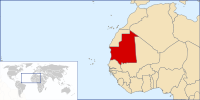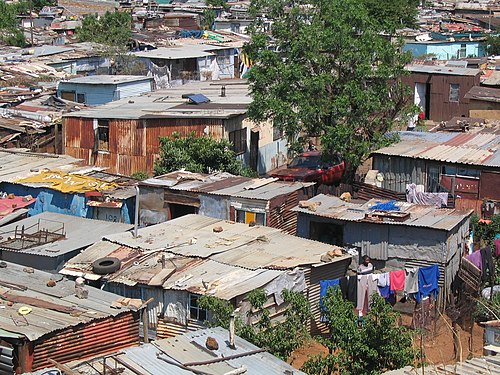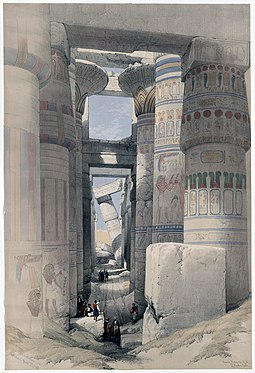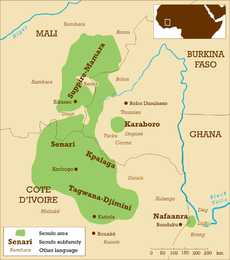
Back Portal:Afrika ALS بوابة:إفريقيا Arabic ܬܪܥܐ:ܐܦܪܝܩܐ ARC Portal:Afrika Azerbaijani Партал:Афрыка BE-X-OLD Портал:Африка Bulgarian دەروازە:ئەفریقا CKB Portál:Afrika Czech Portal:Afrika German Portal:Afrika DIQ



Africa is the world's second-largest and second-most populous continent after Asia. At about 30.3 million km2 (11.7 million square miles) including adjacent islands, it covers 20% of Earth's land area and 6% of its total surface area. With 1.4 billion people0 as of 2021, it accounts for about 18% of the world's human population. Africa's population is the youngest amongst all the continents; the median age in 2012 was 19.7, when the worldwide median age was 30.4. Despite a wide range of natural resources, Africa is the least wealthy continent per capita and second-least wealthy by total wealth, ahead of Oceania. Scholars have attributed this to different factors including geography, climate, corruption, colonialism, the Cold War, and neocolonialism. Despite this low concentration of wealth, recent economic expansion and the large and young population make Africa an important economic market in the broader global context. Africa has a large quantity of natural resources and food resources, including diamonds, sugar, salt, gold, iron, cobalt, uranium, copper, bauxite, silver, petroleum, natural gas, cocoa beans, and tropical fruit.
Africa straddles the equator and the prime meridian. It is the only continent to stretch from the northern temperate to the southern temperate zones. The majority of the continent and its countries are in the Northern Hemisphere, with a substantial portion and a number of countries in the Southern Hemisphere. Most of the continent lies in the tropics, except for a large part of Western Sahara, Algeria, Libya and Egypt, the northern tip of Mauritania, and the entire territories of Morocco, Ceuta, Melilla, and Tunisia which in turn are located above the tropic of Cancer, in the northern temperate zone. In the other extreme of the continent, southern Namibia, southern Botswana, great parts of South Africa, the entire territories of Lesotho and Eswatini and the southern tips of Mozambique and Madagascar are located below the tropic of Capricorn, in the southern temperate zone.
Africa is highly biodiverse; it is the continent with the largest number of megafauna species, as it was least affected by the extinction of the Pleistocene megafauna. However, Africa also is heavily affected by a wide range of environmental issues, including desertification, deforestation, water scarcity, and pollution. These entrenched environmental concerns are expected to worsen as climate change impacts Africa. The UN Intergovernmental Panel on Climate Change has identified Africa as the continent most vulnerable to climate change.
The history of Africa is long, complex, and varied, and has often been under-appreciated by the global historical community. Africa, particularly Eastern Africa, is widely accepted to be the place of origin of humans and the Hominidae clade, also known as the great apes. The earliest hominids and their ancestors have been dated to around 7 million years ago, including Sahelanthropus, Australopithecus africanus, A. afarensis, Homo erectus, H. habilis and H. ergaster, the earliest Homo sapiens (modern human) remains, found in Ethiopia, South Africa, and Morocco, date to circa 233,000, 259,000, and 300,000 years ago, respectively, and Homo sapiens is believed to have originated in Africa around 350,000–260,000 years ago. Africa is also considered by anthropologists to be the most genetically diverse continent as a result of being the longest inhabited. (Full article...)
Selected article –

Featured pictures –
Did you know (auto-generated) -

- ... that South African nurse Stella Madzimbamuto filed an appeal in 1968 with the Privy Council of the United Kingdom that resulted in the Rhodesian government being declared illegal?
- ... that the British South Africa Police's Black Boots support unit were dubbed "terr hungry" for apparently enjoying killing suspected terrorists in Rhodesia?
- ... that a former member of the French Senate ended up being exiled to the northern Central African Republic by the future emperor?
- ... that Diving With a Purpose, a nonprofit focused on maritime archaeology, helped identify and document the wreck of the 18th-century Portuguese slave ship São José Paquete Africa?
- ... that South African anti-apartheid activist Ebrahim Ismail Ebrahim confused warders at the Robben Island maximum security prison by playing Bollywood music?
- ... that Mimi Fawaz's work includes a documentary on the life of South African president Nelson Mandela?
Categories
Selected biography –
Muhammad Anwar es-Sadat (25 December 1918 – 6 October 1981) was an Egyptian politician and military officer who served as the third president of Egypt, from 15 October 1970 until his assassination by fundamentalist army officers on 6 October 1981. Sadat was a senior member of the Free Officers who overthrew King Farouk I in the Egyptian Revolution of 1952, and a close confidant of President Gamal Abdel Nasser, under whom he served as Vice President twice and whom he succeeded as president in 1970. In 1978, Sadat and Menachem Begin, Prime Minister of Israel, signed a peace treaty in cooperation with United States President Jimmy Carter, for which they were recognized with the Nobel Peace Prize.
In his 11 years as president, he changed Egypt's trajectory, departing from many political and economic tenets of Nasserism, reinstituting a multi-party system, and launching the Infitah economic policy. As President, he led Egypt in the Yom Kippur War of 1973 to regain Egypt's Sinai Peninsula, which Israel had occupied since the Six-Day War of 1967, making him a hero in Egypt and, for a time, the wider Arab World. Afterwards, he engaged in negotiations with Israel, culminating in the Camp David Accords and the Egypt–Israel peace treaty; this won him and Menachem Begin the Nobel Peace Prize, making Sadat the first Muslim Nobel laureate. Although reaction to the treaty—which resulted in the return of Sinai to Egypt—was generally favorable among Egyptians, it was rejected by the country's Muslim Brotherhood and the left, which felt Sadat had abandoned efforts to ensure a State of Palestine. With the exception of Sudan, the Arab world and the Palestine Liberation Organization (PLO) strongly opposed Sadat's efforts to make a separate peace with Israel without prior consultations with the Arab states. His refusal to reconcile with them over the Palestinian issue resulted in Egypt being suspended from the Arab League from 1979 to 1989. The peace treaty was also one of the primary factors that led to his assassination; on 6 October 1981, militants led by Khalid Islambouli opened fire on Sadat with automatic rifles during the 6 October parade in Cairo, killing him. (Full article...)Selected country –
 |
 |
||

| |||
Mauritania (Arabic: موريتانيا Mūrītāniyā), officially the Islamic Republic of Mauritania, is a country in northwest Africa. It is bordered by the Atlantic Ocean on the west, by Senegal on the southwest, by Mali on the east and southeast, by Algeria on the northeast, and by the Moroccan-annexed territory of Western Sahara on the northwest. It is named after the ancient Berber kingdom of Mauretania. The capital and largest city is Nouakchott, located on the Atlantic coast.
Approximately three-fourths of Mauritania is desert or semidesert. As a result of extended, severe drought, the desert has been expanding since the mid-1960s. A majority of the population still depends on agriculture and livestock for a livelihood, even though most of the nomads and many subsistence farmers were forced into the cities by recurrent droughts in the 1970s and 1980s. Mauritania has extensive deposits of iron ore, which account for almost 50% of total exports. The nation's coastal waters are among the richest fishing areas in the world, but overexploitation by foreigners threatens this key source of revenue. (Read more...)
Selected city –

Lomé (UK: /ˈloʊmeɪ/ LOH-may, US: /loʊˈmeɪ/ loh-MAY) is the capital and largest city of Togo. It has an urban population of 837,437 while there were 2,188,376 permanent residents in its metropolitan area as of the 2022 census. Located on the Gulf of Guinea at the southwest corner of the country, with its entire western border along the easternmost edge of Ghana's Volta Region, Lomé is the country's administrative and industrial center, which includes an oil refinery. It is also the country's chief port, from where it exports coffee, cocoa, copra, and oil palm kernels.
Its city limits extends to the border with Ghana, located a few hundred meters west of the city center, to the Ghanaian city of Aflao and the South Ketu district where the city is situated, had 160,756 inhabitants in 2010. The cross-border agglomeration of which Lomé is the centre has about 2 million inhabitants as of 2020. (Full article...)In the news
- 12 February 2024 –
- Two boats collide on the Congo River near Kinshasa, Democratic Republic of the Congo; with the death toll remains unclear. (AP)
- 11 February 2024 – 2023 Africa Cup of Nations
- In association football, hosts Ivory Coast win their third Africa Cup of Nations by defeating Nigeria 2–1 in the final. Sébastien Haller scores the winning goal in the 81st minute. (The Guardian)
- 10 February 2024 – Somali civil war
- Four Emirati soldiers and a Bahraini military officer are killed, while ten other people are injured, when a soldier opens fire at a military base in Mogadishu, Somalia, before being killed in the ensuing shootout. Al-Shabaab claims responsibility. (AP)
- 10 February 2024 –
- A Eurocopter EC130 helicopter crashes near Nipton, California, United States, killing all the six people on board, including Nigerian banker Herbert Wigwe. (CBS News)
- 10 February 2024 – 2023–2024 Senegalese protests
- Violent protests occur in Senegal following an announcement by President Macky Sall that presidential elections have been delayed from February 25 to December 15. (Sky News)
- 9 February 2024 –
- At least 18 people are killed during a collision between a bus and a truck on a road in Kinshasa, Democratic Republic of the Congo. (AP)
Updated: 16:33, 14 February 2024
General images -
Africa topics
More did you know –
- ... that at approximately 5,000 years old, the Lothagam North Pillar Site is thought to be the earliest and largest monumental cemetery in eastern Africa?
- ... that a 2020 study found that African countries which allowed foreign funding of NGOs had a higher voter turnout?
- ... that Essop Moosa, who was of Indian origin, became the first non-white player to play for an all-white soccer team in South Africa, appearing under a pseudonym?
- ... that the Seventh German Inner Africa Research Expedition served as cover for a secret First World War espionage mission?
Related portals
Major Religions in Africa
North Africa
West Africa
Central Africa
East Africa
Southern Africa
Associated Wikimedia
The following Wikimedia Foundation sister projects provide more on this subject:
-
Commons
Free media repository -
Wikibooks
Free textbooks and manuals -
Wikidata
Free knowledge base -
Wikinews
Free-content news -
Wikiquote
Collection of quotations -
Wikisource
Free-content library -
Wikispecies
Directory of species -
Wikiversity
Free learning tools -
Wikivoyage
Free travel guide -
Wiktionary
Dictionary and thesaurus
More portals
© MMXXIII Rich X Search. We shall prevail. All rights reserved. Rich X Search




















































































